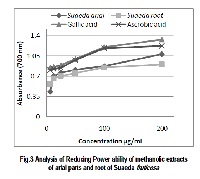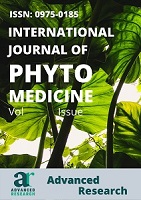Anticancer, antioxidant and antimicrobial activities of Suaeda fruticosa related to its phytochemical screening
Keywords:
Suaeda fruticosa, Human lung carcinoma, Hormone dependent prostrate carcinoma, DPPHAbstract
Concerning anticancer evaluation of methanolic extract of Suaeda fruticosa arial parts demonstrated the utmost anticancer activity with IC50 value of 50 μg/ml against human lung carcinoma (LU-1), the same extract displayed a preeminent activity with IC50 ≥ 50 μg/ml against hormone dependent prostrate carcinoma (LnCaP). The analyzed root extract exhibited IC50 ≤ 65 μg/ml against hormone dependent prostrate carcinoma (LnCaP) whereas, the same extract demonstrated IC50 ≤ 55 μg/ml against human lung carcinoma (LU-1). The highest content of total phenolic (0.52-0.67 mg gallic acid equiv./g) and total flavonoids (0.44 mg/g D/W) content was detected in the arial part of Suaeda fruticosa. MIC value of 50-85 μg ml−1 has been observed gainst Aspergillus fumigates, Aspergillus niger, Fusarium solani and Mucor sp in comparision with 1-2.5μg/ml of Terbinafine used as a standard fungicide. MIC value of 80 μg/ml and 35 μg ml−1 of Suaeda fruticosa arial parts and root extract against bacterial pathogen Klebsiella pneumonia and 50 and 90 μg ml−1 against Enterococcus has been measured. DPPH radical scavenging activity of Suaeda fruticosa with IC50 values of ≤ 100 μg/ml and ≤ 50 μg ml−1 was observed whereas, hydrogen peroxide scavenging activity with IC50 values of ≤ 12.5 μg/ml for arial parts and ≤ 25 μg ml−1 for the root extract of Suaeda fruticosa has been shown with galllic acid (R2= 0.819) and ascorbic acid (R2= 0.728). These data suggested that the methanolic extract of Suaeda fruticosa could be potential candidates for natural antioxidants and anticancer. The findings demonstrated the remarkable potentiality of Suaeda fruticosa as valuable source of antioxidant and anticancer capacities.
References
. Ksouri, Oueslati, Samia; Riadh;
Falleh, Hanen; Pichette, Andre;
Abdelly, Chedly; Legault, Jean.
Phenolic content, antioxidant, antiinflammatory and anticancer
activities of the edible
halophyte Suaeda fruticosa Forssk.
Food chemistry. 2012. 943-947(2).
. Oueslati, Samia; Trabelsi, Najla;
Boulaaba, Mondher; Legault, Jean;
Abdelly, Chedly; Ksouri, Riadh.
Evaluation of antioxidant activities of
the edible and
medicinal Suaeda species and
related phenolic compounds.
Industrial Crops and Products. 2012.
-518(1).
. Bennani-Kabchi N; el Bouayadi F;
Kehel L; Fdhil H; Marquie G. Effect
of Suaeda fruticosa aqueous extract
in the hypercholesterolaemic and
insulin-resistant sand rat. Therapie.
725-730(6).
. Saidana, Dhouha; Mahjoub, Samia;
Boussaada, Olfa; Chriaa, Jihane;
Mahjoub, Mohamed Ali; Cheraif,
Imed; Daami, Majda; Mighri, Zine;
Helal, Ahmed Noureddine.
Antibacterial and antifungal activities
of the essential oils of two saltcedar
species from Tunisia. Journal of
American oil Chemist Society. 2008.
-826(9).
. Samiullah and Asghari bano. In vitro
inhibition potential of four chenopod
halophytes against microbial growth.
special issue, december, pak. j.
bot.,2011. 43: 115-119.
. Wagner H, Bladt S, Zgainski EM.
Plant drug analysis. Berlin: Springer;
. Trease GE, Evans WC.
Pharmacognosy. 12th ed. London:
ELBS Publication; 1985.
. Chen BH, Li SH, Lin JX, Zhuang HR.
J Fujian Normal University 2003;
:86.
. Liu X, Ardo S, Bunning M, Parry J,
Zhou K, Stushnoff C, LWT 2007;
:552.
. Van-Burden T.P, Robinson WC.
Formation of complexes between
protein and tannin acid. J. Agric
Food Chem. 1981. 1: 77-82.
. Sakanaka, S., Y. Tachibana and Y.
Okada. Preparation and antioxidant
properties of extracts of Japanese
persimmon leaf tea (kakinoha-cha).
Food Chem. 2005, 89: 569-575.
. Harborne. J. B. “Phytochemical
methods, London. Chapman and
Hall Ltd, 1973. 49-188.
. Obadoni, B.O, Ochuko PO.
Phytochemical studies and
Comparative efficacy of the crude
extracts of some homeostatic plants
in Edo and Delta States of Nigeria.
Global J. Pure Appl. Sci. 2001.
:203-208.
. Carron, E.A, J.M. Maran, L.
Montero, A. Fernandozalgo and
A.Dominguez. Antimicrobial
properties of some extracts obtained
from some Mediterranean plants of
medicinal value. Plantes
Medicinales et Phytotherapie, 1987,
: 195-202.
. Washington, J.A. and V.L. Sutter.
“Dilution susceptibility test:
agar and macro-broth dilution
procedures, In: E.H. Lennette, A.
Balows, WJ. Hausler Jr., and J.P.
Truant (Ed,).
. Liu X, Ardo S, Bunning M, Parry J,
Zhou K, Stushnoff C, LWT 2007;
:552.
. Wang TC, Ti MC, Lo SC, Yang CC.
Fitoterapia 2007; 78:248.
. Marino SD, Gala F, Borbone N,
Zollo F, Vitalini S, Visioli F, et al.
Phytochemistry 2007;68:1805.
. Oktay, M., Gulcin, ˙I., Kufrevioglu,
o.i., Determination of in vitro
antioxidant activity of fennel
(Foeniculum vulgare) seed extracts.
Lebensmittel-Wissenchaft und
Technologie. 2003. 36, 263–271.
. Ruch, R.J., Cheng, S.J., Klaunig,
J.F., 1989. Prevention of cytotoxicity
and inhibition of intracellular
communication by antioxidant
catechins isolated from Chinese
green tea. Carcinogenesis 10,
–1008.
. Chung, Y.C, Chang C.T, Chao WW,
Lin CF, Chou ST (2002).
Antioxidative activity and safety of
the 50% ethanolic extract from red
bean fermented by Bacillus subtilis
IMR-NK1. J. Agric. Food Chem., 50:
-2458.
. Skehan P, Storeng R, Scudiero D,
Monks A, McMahon J, Vistica D,
Warren JT, Boskesch H, Kenney S,
Boyd MR. New colorimetric
cytotoxicity assay for anticancerdrug screening. J Natl Cancer Inst
; 82: 1107-1112.
. Rubinstein LV, Shoemaker RH,
Paull KD, Simon RM, Tosini S,
Skehan P, Scudiero DA, Monks A,
Boyd MR. Comparison of in vitro
anticancerdrug-screening data
generated with a tetrazolium assay
versus a protein assay against a
diverse panel of human tumor cell
lines. J Natl Cancer Inst 1990; 82:
-1118 PubMed.
. Zhang HJ, Tamez PA, Hoang VD,
Tan GT, Hung NV, Xuan LT, Huong
LM, Cuong NM, Thao DT, Soejarto
DD, Fong HHS, Pezzuto JM.
Antimalarial compounds from
Rhaphidophora decursiva. J Nat
Prod 2001; 64: 772-777 PubMed.
. Espin JC, Garcia CMT, Tomas BFA
(2007). Nutraceuricals: facts and
fiction. Phytochemistry, 2007. 68:
-3008.
. Lee YR, Woo KS, Kim KJ, Son JR,
Jeong HS. Antioxidant activities of
ethanol extracts from germinated
specialty rough Rice. Food Sci.
Biotechnol. 2007. 16(5): 765 – 770.
. Shimada K, Fujikawa K, Yahara K,
Nakamura T. Antioxidative
properties of xanthan on the
autoxidation of soybean oil in
cyclodextrin emulsion. J. Agric.
Food Chem. 1992 40: 945–948



